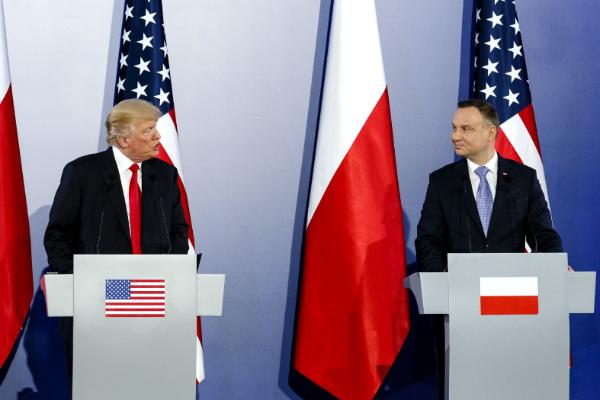
Duda Will Visit Trump. His Predecessors Were Invited Way Earlier
The White House announced that on Sept. 18, Polish President Andrzej Duda will meet with Donald Trump in Washington. The visit was declared to be “official,” which, according to American diplomatic protocol, means that Duda and his wife will be hosted with the full honor afforded to heads of the state.
Representatives of the Polish government are not hiding their pleasure, which is understandable, as an invitation from an American president is always an honor. But they should not go overboard portraying arrangement of the visit as a staggering success.
Polish President in the White House
Duda has waited more than three years for an invitation to the White House, including the 20 months of Trump’s presidency. That is a rather long wait for the head of a particularly dedicated American ally, who also enjoys the support of its current president, who visited Poland last year. Since the beginning of the Third Polish Republic, Duda’s predecessors, starting with Lech Walesa, were invited to visit by their American counterparts after eight to 10 months at most. Duda has met Trump several times in the past during various international forums and even spoke with him, but it is not the same as a tête-à-tête in the Oval Office, followed by a joint press conference broadcast by the media from around the world.
In May this year, the Polish president flew to the U.S., but didn’t even get near Washington, as the White House did not extend an invitation. In the meantime, Trump has already managed to host dozens of leaders, including, for example, the president of Uzbekistan.
America Has Been Critical about the Polish ‘Good Change’
It did not happen for no reason. The Polish government, led by the Law and Justice Party, has declared its friendship with America from the very beginning, which is reasonable after all. But the Polish government will not earn appreciation from a country which holds its Constitution and independent judiciary sacrosanct by attacking and weakening key democratic institutions in Poland. American foreign affairs are led by the president, but he has to be mindful of Congress, which is critical of the Polish “good change.”*
The American military establishment definitely paid attention to the crazy ideas of Polish Defense Minister Antoni Macierewicz, including a military purge as well as a struggle to modernize the army, which significantly impeded military cooperation between the U.S. and Poland. Macierewicz’s resignation probably helped somewhat, but just as a warming in their relations began, the Polish Parliament passed a stupid and humiliating act concerning the Institute of National Remembrance, meant to criminalize any statement about the Polish contribution to Holocaust. Wise men from the Law and Justice Party had a hard time understanding why the U.S. and Israel reacted with shock and indignation. It was only the fundamental change in the act, written last June, which eliminated the risk of penalty, and has paved the way for real detente, offering Duda an invitation to the White House.
What Are the Presidents Going To Talk about?
What can one expect from Duda’s visit besides an enhanced image of the Polish president? He will arrive in the American capital just after the Three Seas Summit,** which implies that when he visits the White House, he will definitely emphasize that Poland would be the perfect hub for an international energy network in Central Europe, and he will also stress Poland’s energy safety. Trump has publicly criticized the Nord Stream II gas pipeline, but in July, Germany stated that it was assured by Washington that American sanctions on German enterprise would not affect this particular investment. (Actually, the Americans did not fully confirm that.)
What remains is to try to negotiate the best possible conditions for importing American liquefied natural gas, as businessman Trump is surely not guided by philanthropy in his relations with other countries. Duda will probably also mention the matter of a permanent American military base in Poland, the biggest goal Poland hopes to achieve with the U.S. Poland is even ready to finance it, which should speak to Trump. But in July, Gen. Ben Hodges, former commanding officer of American forces in Europe, wrote in Politico that the base should not be placed in Poland as it would be a provocation with respect to Russia and would imply friction between the allies, and by allies he meant countries such as Germany or Italy. The general’s opinion basically summarizes the common American view on the topic. Could Trump, who is benevolent toward Poland, but who is also trying to get closer to Russia, possibly say yes to our ideas?
*Editor’s note: “Good change” refers to the name of a program by the Law and Justice government in Poland introduced in the past two years that includes such efforts as legalizing government control of the media and introduction of anti-abortion laws.
**Editor’s note: The Three Seas Summit is a forum of European Union countries in Central and Eastern Europe aimed at creating dialogue on a variety of questions affecting the 12 member states.


